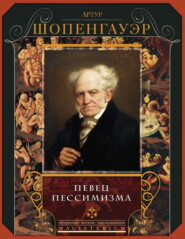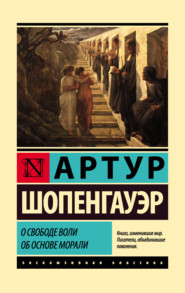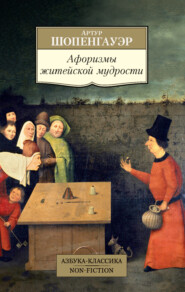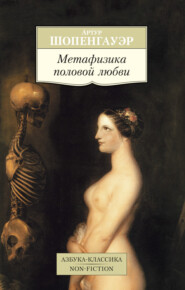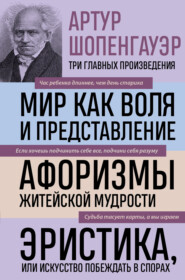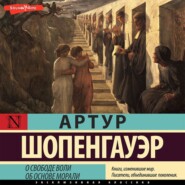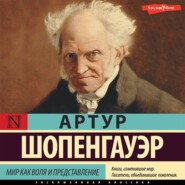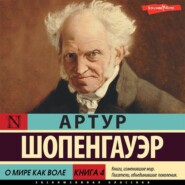По всем вопросам обращайтесь на: info@litportal.ru
(©) 2003-2024.
✖
The Essays of Arthur Schopenhauer; Counsels and Maxims
Настройки чтения
Размер шрифта
Высота строк
Поля
2
vii. (12) 12.
3
Welt als Wille und Vorstellung. Vol. I., p. 58.
4
Welt als Wille und Vorstellung, vol. ii., ch. 16.
5
Letters to and from Merck.
6
Horace. Odes II. x.
7
Republic, x. 604.
8
Translator's Note. From the Anvár-i Suhailí —TheLights of Canopus– being the Persian version of the Table ofBidpai. Translated by E.B. Eastwick, ch. iii. Story vi., p. 289.
9
Translator's Note. Nicholas "Chamfort" (1741-94), a French miscellaneous writer, whose brilliant conversation, power of sarcasm, and epigrammic force, coupled with an extraordinary career, render him one of the most interesting and remarkable men of his time. Schopenhauer undoubtedly owed much to this writer, to whom he constantly refers.
10
Odes II. xi.
11
Iliad, xix, 65.
12
Ibid, xvii, 514
13
Translator's Note. A series of Greek, Latin and French classics published at Zweibräcken in the Palatinate, from and after the year 1779. Cf. Butter, Ueber die Bipontiner und die editiones Bipontinae.
14
Eudem. Eth. VII. ii. 37.
15
As our body is concealed by the clothes we wear, so our mind is veiled in lies. The veil is always there, and it is only through it that we can sometimes guess at what a man really thinks; just as from his clothes we arrive at the general shape of his body.
16
Paradoxa Stoidorum: II.
17
It is a well-known fact, that we can more easily bear up under evils which fall upon a great many people besides ourselves. As boredom seems to be an evil of this kind, people band together to offer it a common resistance. The love of life is at bottom only the fear of death; and, in the same way, the social impulse does not rest directly upon the love of society, but upon the fear of solitude; it is not alone the charm of being in others' company that people seek, it is the dreary oppression of being alone – the monotony of their own consciousness – that they would avoid. They will do anything to escape it, – even tolerate bad companions, and put up with the feeling of constraint which all society involves, in this case a very burdensome one. But if aversion to such society conquers the aversion to being alone, they become accustomed to solitude and hardened to its immediate effects. They no longer find solitude to be such a very bad thing, and settle down comfortably to it without any hankering after society; – and this, partly because it is only indirectly that they need others' company, and partly because they have become accustomed to the benefits of being alone.
18
Translator's Note. The passage to which Schopenhauer refers is Parerga: vol. ii. § 413 (4th edition). The fable is of certain porcupines, who huddled together for warmth on a cold day; but as they began to prick one another with their quills, they were obliged to disperse. However the cold drove them together again, when just the same thing happened. At last, after many turns of huddling and dispersing, they discovered that they would be best off by remaining at a little distance from one another. In the same way, the need of society drives the human porcupines together – only to be mutually repelled by the many prickly and disagreeable qualities of their nature. The moderate distance which they at last discover to be the only tolerable condition of intercourse, is the code of politeness and fine manners; and those who transgress it are roughly told – in the English phrase —to keep their distance. By this arrangement the mutual need of warmth is only very moderately satisfied, – but then people do not get pricked. A man who has some heat in himself prefers to remain outside, where he will neither prick other people nor get pricked himself.
19
Translator's Note. Angelus Silesius, pseudonym for Johannes Scheffler, a physician and mystic poet of the seventeenth century (1624-77).
20
Psalms, lv. 7.
21
Goethe's Faust, Part I., 1281-5.
22
This restricted, or, as it were, entrenched kind of sociability has been dramatically illustrated in a play – well worth reading – of Moratin's, entitled El Café o sea la Comedia Nuova (The Cafe or the New Comedy), chiefly by one of the characters, Don Pedro and especially in the second and third scenes of the first act.
23
Envy shows how unhappy people are; and their constant attention to what others do and leave undone, how much they are bored.
24
De Ira: iii., 30.
25
Epist. xv.
26
It may be observed, in passing, that a great many of the maxims which Goethe puts under the head of Proverbial, are translations from the Italian.
vii. (12) 12.
3
Welt als Wille und Vorstellung. Vol. I., p. 58.
4
Welt als Wille und Vorstellung, vol. ii., ch. 16.
5
Letters to and from Merck.
6
Horace. Odes II. x.
7
Republic, x. 604.
8
Translator's Note. From the Anvár-i Suhailí —TheLights of Canopus– being the Persian version of the Table ofBidpai. Translated by E.B. Eastwick, ch. iii. Story vi., p. 289.
9
Translator's Note. Nicholas "Chamfort" (1741-94), a French miscellaneous writer, whose brilliant conversation, power of sarcasm, and epigrammic force, coupled with an extraordinary career, render him one of the most interesting and remarkable men of his time. Schopenhauer undoubtedly owed much to this writer, to whom he constantly refers.
10
Odes II. xi.
11
Iliad, xix, 65.
12
Ibid, xvii, 514
13
Translator's Note. A series of Greek, Latin and French classics published at Zweibräcken in the Palatinate, from and after the year 1779. Cf. Butter, Ueber die Bipontiner und die editiones Bipontinae.
14
Eudem. Eth. VII. ii. 37.
15
As our body is concealed by the clothes we wear, so our mind is veiled in lies. The veil is always there, and it is only through it that we can sometimes guess at what a man really thinks; just as from his clothes we arrive at the general shape of his body.
16
Paradoxa Stoidorum: II.
17
It is a well-known fact, that we can more easily bear up under evils which fall upon a great many people besides ourselves. As boredom seems to be an evil of this kind, people band together to offer it a common resistance. The love of life is at bottom only the fear of death; and, in the same way, the social impulse does not rest directly upon the love of society, but upon the fear of solitude; it is not alone the charm of being in others' company that people seek, it is the dreary oppression of being alone – the monotony of their own consciousness – that they would avoid. They will do anything to escape it, – even tolerate bad companions, and put up with the feeling of constraint which all society involves, in this case a very burdensome one. But if aversion to such society conquers the aversion to being alone, they become accustomed to solitude and hardened to its immediate effects. They no longer find solitude to be such a very bad thing, and settle down comfortably to it without any hankering after society; – and this, partly because it is only indirectly that they need others' company, and partly because they have become accustomed to the benefits of being alone.
18
Translator's Note. The passage to which Schopenhauer refers is Parerga: vol. ii. § 413 (4th edition). The fable is of certain porcupines, who huddled together for warmth on a cold day; but as they began to prick one another with their quills, they were obliged to disperse. However the cold drove them together again, when just the same thing happened. At last, after many turns of huddling and dispersing, they discovered that they would be best off by remaining at a little distance from one another. In the same way, the need of society drives the human porcupines together – only to be mutually repelled by the many prickly and disagreeable qualities of their nature. The moderate distance which they at last discover to be the only tolerable condition of intercourse, is the code of politeness and fine manners; and those who transgress it are roughly told – in the English phrase —to keep their distance. By this arrangement the mutual need of warmth is only very moderately satisfied, – but then people do not get pricked. A man who has some heat in himself prefers to remain outside, where he will neither prick other people nor get pricked himself.
19
Translator's Note. Angelus Silesius, pseudonym for Johannes Scheffler, a physician and mystic poet of the seventeenth century (1624-77).
20
Psalms, lv. 7.
21
Goethe's Faust, Part I., 1281-5.
22
This restricted, or, as it were, entrenched kind of sociability has been dramatically illustrated in a play – well worth reading – of Moratin's, entitled El Café o sea la Comedia Nuova (The Cafe or the New Comedy), chiefly by one of the characters, Don Pedro and especially in the second and third scenes of the first act.
23
Envy shows how unhappy people are; and their constant attention to what others do and leave undone, how much they are bored.
24
De Ira: iii., 30.
25
Epist. xv.
26
It may be observed, in passing, that a great many of the maxims which Goethe puts under the head of Proverbial, are translations from the Italian.






